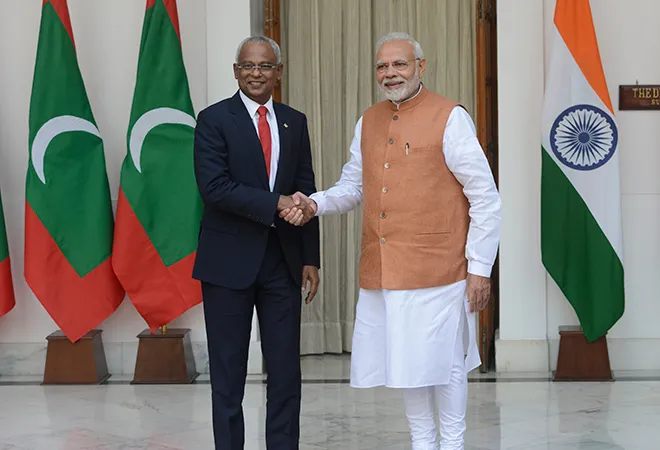-
CENTRES
Progammes & Centres
Location

The visit of Foreign Secretary Harsh Vardhan Shringla to the Maldives is significant for taking forward bilateral relations. Under Maldivian President Ibrahim Solih, bilateral cooperation, especially on the economic front, has become a ‘model’ that New Delhi can adopt to make Prime Minister Narendra Modi’s ‘Neighbourhood First’ a sustained success.
India and the Maldives have had bilateral relations for centuries. Technology has made connectivity easier for everyday contact and exchanges. Maldivian students attend educational institutions in India and patients fly here for superspeciality healthcare, aided by a liberal visa-free regime extended by India.
Tourism is the mainstay of Maldivian economy. The country is now a major tourist destination for some Indians and a job destination for others. Given the geographical limitations imposed on the Maldives, India has exempted the nation from export curbs on essential commodities.
Through the decades, India has rushed emergency assistance to the Maldives, whenever sought. In 1988, when armed mercenaries attempted a coup against President Maumoon Abdul Gayoom, India sent paratroopers and Navy vessels and restored the legitimate leadership under Operation Cactus. The 2004 tsunami and the drinking water crisis in Male a decade later were other occasions when India rushed assistance. At the peak of the continuing COVID-19 disruption, India rushed $250 million aid in quick time. New Delhi also rushed medical supplies to the Maldives, started a new cargo ferry and also opened an air travel bubble, the first such in South Asia. It has promised more, as and when required.
Abdulla Yameen was in power when the water crisis occurred. Despite early strains in relations, India rushed help on a humanitarian basis. Now, the Yameen camp has launched an ‘India Out’ campaign against New Delhi’s massive developmental funding for creating physical, social and community infrastructure, and incumbent President Solih’s government retaining two India-gifted helicopters and their operational military personnel. Maldivian protesters recently converted their demand for early release of Mr. Yameen — sentenced to five years of imprisonment in a money laundering case, pending appeal — into one asking the Solih administration to ‘stop selling national assets to foreigners’, implying India. They forget that massive supplies of drinking water came only aboard Indian Navy vessels and the COVID-19 medicines were delivered aboard an Indian Air Force aircraft. Such assistance helps all Maldivians, including Mr. Yameen’s supporters. Likewise, the Yameen administration too had deployed the helicopters for humanitarian operations. It is against this background, given also Mr. Yameen’s tilt towards China and bias against India when in power, that the Solih administration’s no-nonsense approach towards trilateral equations provide ‘strategic comfort’ to India.
Yet, India should be concerned about the protests as well as the occasional rumblings within the ruling Maldivian Democratic Party (MDP) of Mr. Solih. Mohamed Nasheed, who was the nation’s first President elected under a multiparty democracy, now Parliament Speaker, continues to head the party, and had also named Mr. Solih as presidential candidate in 2018, but there are apparent strains between them. Mr. Nasheed’s going public on issues, including corruption charges against ministers, that should have been raised at the highest-level could affect the MDP during the run-up to the 2023 presidential polls. Also, Mr. Nasheed’s on-again-off-again call for a changeover to a ‘parliamentary form of government’ can polarise the over-politicised nation even more.
Despite this, India can take respite in the ‘strategic comfort’ of the ‘India First’ policy of the Solih government. Given this background and India’s increasing geostrategic concerns in the shared seas, taking forward the multifaceted cooperation to the next stage quickly could also be at the focus of Mr. Shringla’s visit.
This commentary originally appeared in The Hindu.
The views expressed above belong to the author(s). ORF research and analyses now available on Telegram! Click here to access our curated content — blogs, longforms and interviews.

N. Sathiya Moorthy is a policy analyst and commentator based in Chennai. ...
Read More +